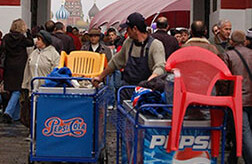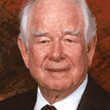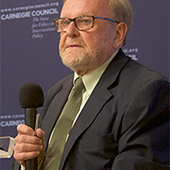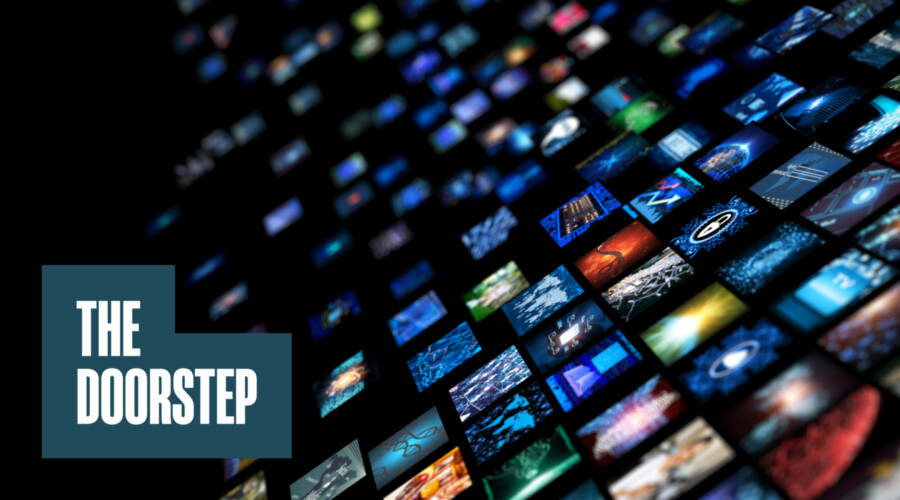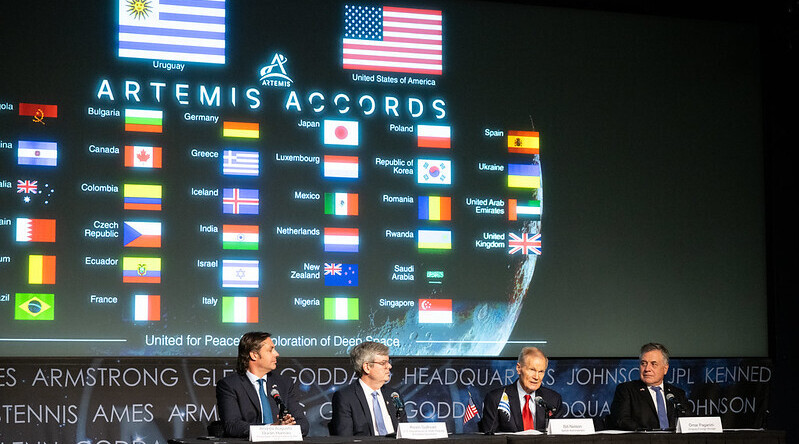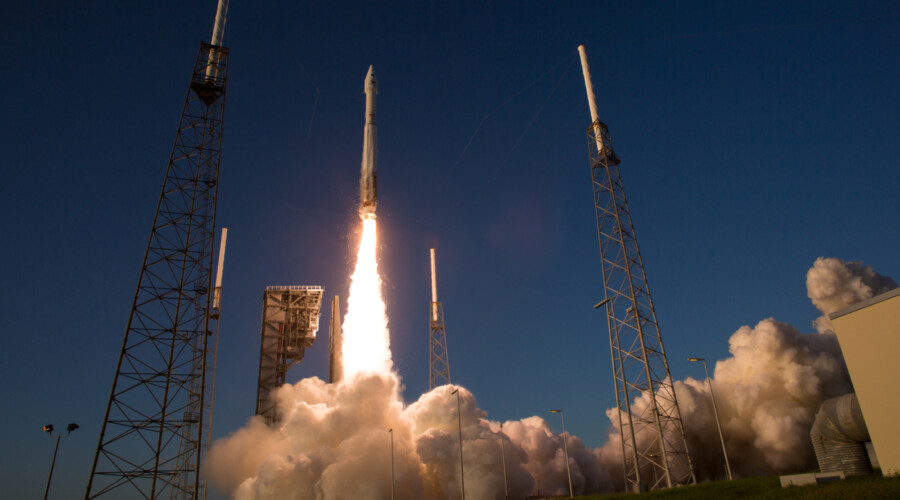Kendall recalls how he opened up the former Soviet Union for PepsiCo, bringing in other U.S. companies as well. He goes on to discuss his warm relationship with Putin, his admiration for the Russian people, and his hopes for better U.S.-Russia relations.
DAVID SPEEDIE: I'm David Speedie, director of the program on U.S. Global Engagement at Carnegie Council for Ethics in International Affairs, and today I am speaking with one of the titans of American industry, former chairman and CEO of PepsiCo, Donald Mcintosh Kendall.
Mr. Kendall—I use the middle name Mcintosh because I know you're very proud of your Scottish heritage. That is true, right?
DONALD KENDALL: Right.
DAVID SPEEDIE: Mr. Kendall, obviously what has brought us together often in the past, and where you've been generous in your support of the Council's work, has been Russia. But of course your involvement goes back to when Russia was part of the Soviet Union.
Let me ask you first: Why the Soviet Union, going back more than 50 years? What made you identify the Soviet Union as a market for Pepsi?
DONALD KENDALL: Actually, I was running our international company, and our friends in Atlanta [Coca Cola] had Western Europe. They went in after World War II. I decided, why not go after Eastern Europe and Russia from a marketing standpoint? It was during Eisenhower's time, and Eisenhower wanted to try and get relations started between Russia and the United States, and sent Nixon over there. The United States had an exhibit in Russia and Russians came over and had an exhibit here.
Nixon asked me to participate in this. A lot of companies wouldn't do it because there was a lot of anti-Russian feeling here. In fact, our friends in Atlanta refused to go to this thing. So I went over there with Nixon and gave Khrushchev his first Pepsi and met the Russians and found out that they're wonderful people and wound up trying to get involved.
You may know that when the plane got shot down that slowed relations again. They didn't get started again until the 1970s.
Then I went over with a group of people, because Nixon was anxious to see if we could get relationships going. I headed a group. I met with the top people and made a presentation/proposal on Pepsi to Kosygin. Fortunately, he got very excited about it, and we made a deal for the opening of 10 plants. We started opening up the first plants in 1972.
I got very involved in Russia at that point because I was convinced it was a great opportunity for the United States and Russia to get together, because their people were wonderful people. They had some lousy management at times, but, on the other hand, we occasionally had bad management too.
But I thought our people would really get along together, and I wanted to get things started and try and get our people together. I set up the first U.S.-Soviet Trade and Economic Conference. In fact, we had the first meeting at the White House with Nixon, the first board meeting. We got a relationship started and got companies to go over there. We took a whole group of companies over and got things started.
DAVID SPEEDIE: Who were some of the other companies that were in the forefront in those days, Mr. Kendall? You were really a trailblazer, going to the Soviet Union. So who followed you at that point?
DONALD KENDALL: There were companies that went over. They didn't all get involved. Companies like IBM went over. Some of their people were actually excited about the opportunities. But not many of them followed up for a while. It was a slow process, but there are a lot of companies over there today.
DAVID SPEEDIE: And you said yourself it took more than 10 years after that first visit to really make the breakthrough in having a presence there, because of some political and external situations that developed, the plane being shot down and so on and so forth.
DONALD KENDALL: The plane, of course, caused the biggest problem. They didn't get going until Nixon.
DAVID SPEEDIE: This is the U2 spy plane, of course.
DONALD KENDALL: Nixon had always wanted to get the relationship started. He was interested in international. A lot of people don't realize he opened up China too.
DAVID SPEEDIE: Khrushchev, of course, was regarded as something of a reformer, in new thinking on Stalin and so on, in the Soviet Union. But then there was a series of people—Brezhnev, Andropov, Chernenko and others—who were a bit more old Soviet style. So that must have hindered things for a little bit too, the political climate?
DONALD KENDALL: A lot of them were interested in starting relations. Brezhnev was very interested in starting relations. So was Kosygin.
DAVID SPEEDIE: Kosygin was the prime minister.
DONALD KENDALL: Yes. They were both very friendly. In fact, I carried messages back and forth between Nixon and Brezhnev.
DAVID SPEEDIE: Really?
DONALD KENDALL: Trying to get things going.
DAVID SPEEDIE: Well, I won't ask you what the messages were, because I'm sure they were secret affairs of state. But clearly you were a confidant of first vice president, and then President Nixon, obviously. That was a long friendship for you, yes?
DONALD KENDALL: Yes, it was. We worked together. He traveled the world with me in the 1960s when he was out of office. He helped me open up some of the countries.
DAVID SPEEDIE: In fact, you speak in another interview I've read, which we actually had translated from Russian, of having similar origins to Nixon, both coming from fairly small-town, rural environments. So you had a lot in common with Nixon.
DONALD KENDALL: Oh, very much so. We had a very close personal relationship. In fact, he played the piano at our wedding.
DAVID SPEEDIE: Is that right? Was he a good piano player?
DONALD KENDALL: Yes, very good.
DAVID SPEEDIE: He was a good sport for playing, that's for sure.
You say in this interview that I'm quoting from, which was actually in Itogi magazine in Russia, this goes back to your very, very early days in New Rochelle.
You say, "From the 1970s I learned in order to become a good salesman you have to know your product perfectly, you have to believe strongly in it, you have to befriend your buyer, and get to know his or her strengths and weaknesses, and of course you have to maintain good terms with your customer over the long term."
That's good common-sense advice. I would imagine that served you well in dealing with the Soviet Union and Russia over all these years. You were moving into a very different country, a very different environment from the home base, so to speak.
DONALD KENDALL: Well, once you travel to Russia and spend some time over there and find out that the people are really wonderful people, and it's not their fault that some things have happened—leaderships have caused problems, but that's not necessarily the people down in the streets. When you really meet people there and stay in their homes and have dinner with them and get to know them, you find out that they're wonderful people and people you can work with.
I got confident that we could work with them and do things. That's why I decided I wanted to get a program started, not only selling Pepsi, but I wanted to get the relationship started. I set up the first U.S.-Soviet Trade and Economic Council to try and get things going back and forth between our two countries. Of course, during Nixon's time this was very helpful, because he was very supportive of this.
We really got things going. I took our whole board of directors over to Russia, which people couldn't believe. I took them for a meeting when we opened one of our plants. The people who came over, like the head of IBM, who was on our board, he couldn't believe what he saw when he got over there. It's communication and getting to see people and understand what's going on and seeing the opportunities. That's why I decided really to spend a lot of time opening the market.
Russia today is the biggest market we have outside the United States. We have over 30,000 employees over there.
DAVID SPEEDIE: I may have told you about coming to Moscow a year ago now, in late winter, on a dreary day, driving up from the city center for an interview I was doing, and suddenly at the top of a hill the mists cleared and there was a Pepsi sign in Russian at the top of a hill. So it's very prominent, shall we say. Pepsi is still, as a result of your work, very much one of the recognized and respected foreign companies in Russia.
DONALD KENDALL: And we're by far the biggest over there now.
We're number one in Russia of any companies in this type of business. Of course there are companies in other industries—finance is bigger—but we're by far number one in the market.
DAVID SPEEDIE: I want to get to the contemporary situation in a moment. But tell me a little bit about some of the other friendships you made at that time. You mentioned, of course, the various premiers of the Soviet Union. You mentioned Kosygin. I know that Dobrynin, who was the long-time ambassador here in Washington, was also a good friend of yours.
DONALD KENDALL: Anatoly Dobrynin became a very close friend. It was not only the relationship between the United States and Russia, but we became family friends. He'd come to our place and we'd go to his. I stayed in touch with him until he finally passed away, and I still stay in touch with his wife. She's still around. I still talk to her on the phone. It's a very close relationship.
I had a very close relationship with Kosygin and Brezhnev, also carrying messages back and forth, and had discussions about how to try and improve relationships and get things done.
DAVID SPEEDIE: Beyond the political, I know that you really immersed yourself in Russian life and culture. Mikhail Baryshnikov and Mr. Gergiev, the music director of the Mariinsky Orchestra, are good friends also.
DONALD KENDALL: Very good friends. I was chairman of the American Ballet Theater and brought Baryshnikov in and got him started with the American Ballet Theater. When I left American Ballet Theater, I put him in charge.
DAVID SPEEDIE: Not a bad succession line, you might say.
Let me fast-forward now a little bit to the current day. Obviously, you were also very friendly with and there is a great mutual respect between you and Vladimir Putin, once again the president of Russia for a third term. He gave you the Order of Friendship, which is the highest civilian honor. Talk a little bit about Putin as a man, as a leader, as someone that you've dealt with on a one-to-one basis.
DONALD KENDALL: As you know, when Putin took over after Yeltsin, Yeltsin had left a real mess. Things had really gotten screwed up. I think it was unbelievable what the young man, Putin, who took over a country like Russia, accomplished. If you look at the record going back to where Putin started and what it is today, how can you question Putin and his ability and his skill given that the economy and the lives of the people have improved so much from the time that he took over?
I'm so glad that he's staying on longer, because he's got the ability and he's got the following. You know, not many presidents in the United States have had the approval rating that Putin has. Even in this last election, when his rating dropped from up in the high 60s down to 50, that's still higher than any U.S. president's approval rating.
DAVID SPEEDIE: That's absolutely right.
DONALD KENDALL: People are glad to have Putin back because of his record, what he's done. I think he will continue to improve things.
DAVID SPEEDIE: I think we have a tendency to view things as we want to see them. Putin is not always willing to do the United States's bidding, and that makes him unpopular here. But he's doing what he thinks is in Russia's interest. But also, we tend to see things through the eyes of just Moscow, the center. The fact is that Putin in the election won every single electoral district in the presidential election except for Moscow, where he got in the high 40s I think.
So he is, as you correctly say, very much the representative of the Russian people at this time, whether we like it or not. He is the president of Russia, democratically elected.
DONALD KENDALL: The thing that you have to realize over here that is the problem is that people hear nothing but negative things about Russia because of our press. They never tell any of the good stories. That's why I was very anxious to get a U.S.-Russia council set up, and also get a program going of getting the young people. I started to put up money to finance a program of Russian students coming to the United States and American students going over there so that this young generation could see what's really happening in the two countries.
Even when I sent the faculty over there for the first university, when they came back they couldn't believe what they saw over there. Over here people just heard nothing but negative things. When they go over there, they see all these wonderful things that are going on and how wonderful the people are. So we've got to find a way to get more information out to the public so they can really see the true story.
DAVID SPEEDIE: Do you think there's a certain holdover from the Cold War at work here, in the sense that we still can't quite shake off the notion of the Soviet Union, even though it's broken up? I have to tell you that I have heard more than one member of Congress talk about "the Soviets," meaning the Russians, these days. Is that something that we'll manage to get rid of over time? Do you agree with that?
DONALD KENDALL: You look at Congress, the Senate, and you still have people there living back in the early days of the Soviet Union. They've never seen what's happened. They don't know a thing about Russia. All they go on is what they heard about Russia in the past. They've built up this attitude about Russia and they haven't changed. They haven't looked at what the changes are over there.
DAVID SPEEDIE: And of course the physical embodiment of that is something you and I have talked about a lot. As you know, we've done a lot of work on repealing the Jackson-Vanik Amendment, which, as we look at the calendar, we hope is just a few days from a well-deserved and overdue end, demise, in terms of punishing Russia because of something that happened in the Soviet Union 30-odd years ago.
DONALD KENDALL: If Nixon had still been president, I think he would have done everything he could to stop it.
DAVID SPEEDIE: I know you've been very active in calling people about it.
DONALD KENDALL: That's right. We tried to get it stopped because it was ridiculous. But, unfortunately, there came a time when Nixon was in trouble, so it got passed, unfortunately. It was political. Scoop Jackson was running for votes.
DAVID SPEEDIE: Now of course, even though they are going to probably—and touch wood—get rid of this thing, they will almost certainly introduce another amendment that punishes Russians or Russia, called the Magnitsky bill. That is of course a long story, but it's basically a human rights-induced thing, which some would say is unnecessary because there already exist sanctions against officials who are suspected of human rights abuses.
But it seems that we can't quite get that Soviet-era mentality behind us. There's something about Russia that makes Congress irrational.
DONALD KENDALL: In the Congress you've got too many of these people that don't know anything about Russia, what's going on today. They're just living in the past. As long as you've got those people there who continue to live in the past, it's not going to change until we get them out of there.
DAVID SPEEDIE: Getting back to the business side of things, you mentioned setting up the U.S.-Soviet Trade and Economic Council. I had not heard of this before. I always learn something from you. Did the U.S.-Russia Business Council develop from that?
DONALD KENDALL: Yes. That's where it started.
DAVID SPEEDIE: Are you active in the U.S.-Russia Business Council today?
DONALD KENDALL: I'm not really active now, but I was very involved from the start. I got the thing started and stayed very involved. As I said, we had our first meeting in the White House. But I'm not involved in it today.
DAVID SPEEDIE: Well, I still regard you as being involved, whether it's by telephone or in person or whatever.
DONALD KENDALL: I'm still very much involved in Russia.
DAVID SPEEDIE: When were you last in Russia?
DONALD KENDALL: A year ago. I had a meeting with Putin because the company wanted to buy a big company over there and they wanted to get quick approval. So they asked me to go over and get it done. I arranged a meeting with Putin and got the thing approved.
DAVID SPEEDIE: So you are still involved pretty directly when it matters?
DONALD KENDALL: Yes.
DAVID SPEEDIE: Although I know you're not involved in day-by-day operations at this point with Pepsi at all, how do you see doing business with Russia these days? Obviously, one hears about corruption, with rule of law, governance issues, and so on.
What I say to that is Russia is barely 20 years old. We had plenty of problems as a country in our infancy. We had a civil war almost 100 years after we became an independent country. But we seem to be all too willing to criticize Russia, which is just over 20 years old.
But how do you see the business climate, or what do you hear from others you know who are working in Russia at the moment? What thoughts do you have on that?
DONALD KENDALL: You know, we haven't had any of those problems over there. We've expanded. I've told you that we're the biggest employer over there now. We have over 30,000 people that are employees. We haven't had any of these problems.
I think you hear a lot of things. People have just heard rumors or heard stories and never heard any good. If you talk to people who are really operating over there, you will find out that they're not having troubles in Russia, any more problems than you have anywhere else.
You know, you hear people telling you it sounds like there's a bunch of crooks over there. We haven't had any problem with crooks. It's not different operating there than in other countries around the world.
Remember, we're now the biggest foreign company in the food and beverage business in Russia now.
DAVID SPEEDIE: And I would assume—let's put it this way: if I were your man in Russia and I were having a problem, you'd be the person I'd come to. So you would know about it, if you were having problems.
DONALD KENDALL: Yes, I sure would.
DAVID SPEEDIE: What is Putin like as a person, just sitting talking with him as you're talking with me? Do you find him friendly?
DONALD KENDALL: He's very friendly and has a good sense of humor. You know Putin, you walk into his office, he gets up and greets you like it's a great friendly relationship. He really listens to people and responds.
I think Putin is a fantastic leader. He took over a heck of a mess. You hear things over here about Putin, negative things. It's absolutely ridiculous, because they haven't been over there, they don't know what this guy has accomplished. The people who have gone over there and really worked there know Putin has really accomplished a lot and are big supporters. I was so happy to see Putin reelected because I know we're going to continue on the right path again.
DAVID SPEEDIE: To the extent that you've been able to talk to him about relations between the two countries, is he well disposed towards the United States in your opinion? Does he look for a good relationship?
DONALD KENDALL: Putin would like to see a good relationship. The problem is that statements keep coming out over here that are negative, that make it very difficult. If we could get somebody finally that would really make an effort to start a relationship, we'd get it. That's true of any kind of relationship. If you do nothing but say negative things about a country, how are you going to get a relationship with them?
I think he'd get it very well. I was very pleased Obama went over in his first meeting, and it looked like things were really going to get going. If he is reelected president, I hope he pushes through to improve things.
DAVID SPEEDIE: I think that covers the main bases that I wanted to discuss with you, Mr. Kendall. I wanted to talk about your original foray into Russia, how that has developed over the years, how you see the current situation.
Any last closing words for you, or have we covered all the bases, do you think?
DONALD KENDALL: I'm glad to see you're still interested yourself in improving things in Russia.
DAVID SPEEDIE: Very much so.
DONALD KENDALL: Keep working on it.
DAVID SPEEDIE: I can't match your tenure, as it were. We have only been about 25 years working on Russia. But we share the same passion and the same commitment to getting things right.
DONALD KENDALL: We've got to get an administration that really wants to work on it again. I wish we'd get Richard Nixon back.
DAVID SPEEDIE: Well, someone with that sense of vision. When you hear about regarding Russia as a strategic enemy, you wonder. You scratch your head and think, "What's going on here? This doesn't make any sense." Among the top 10 largest economies in the world they're now about to be in the World Trade Organization—that's imminent—it just seems to be totally in our interest in every conceivable way to have a good relationship with Russia; not just to be nice to Russia, but for ourselves.
You obviously feel that way, with 30,000 people there, the largest food and beverage retail chain. I don't have to sell you on this. You've led the way. But it just seems so obvious that a good relationship with Russia is in our own interest, not just theirs.
DONALD KENDALL: That's right. It's the biggest market we have outside the United States.
DAVID SPEEDIE: Exactly.
Well, thank you so very much again.
DONALD KENDALL: Thank you.
